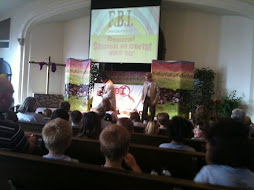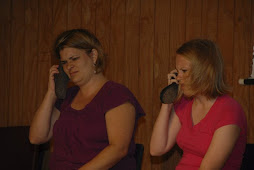Thursday, April 5, 2012
EASTER SUNDAY
This coming Sunday is Easter, a day of togetherness and celebration for families far and wide. Hams will be devoured! Sweet potatoes will meet their doom, and thousands of chocolates will melt as the sun beats down on their plastic-egg-ovens. It’s a special time, a fun time for children. It will be in the Prater household I promise (with three children under the age of 10).
Easter is also a special “holiday” for hundreds of millions of “believers” in the Christian religion who remember that first “Resurrection Sunday.” Because of this attendance at church gatherings will swell. In many churches, the normal program of worship will be altered to accommodate special Easter services.
Easter is an important opportunity for churches. Many will be present at worship services that haven’t attended all year and may not again until this time next year. Therefore, it’s an infrequent opportunity for churches to make an impression on folks who believe at some level, but haven’t yet made a commitment to Christ.
Now it should be observed about the interesting historical origin of Easter. It actually seems to have risen from the ancient Saxons who celebrated the return of spring with an uproarious festival commemorating their goddess of offspring and of springtime, Eostre. Later Catholic missionaries in trying to ease the transition of pagans into Catholicism, “Christianized” the celebration by incorporating some of the pre-existing traditional festivities into the celebration of the Resurrection of Jesus Christ, which took place in the same season. So they moved its date to the first Sunday after Passover, and making it a celebration of Christ’ resurrection from the dead. Today, both Catholics and Protestants celebrate Easter as a religious holiday.
Though some have veered from tradition, historically, churches of Christ have no special programs honoring Easter. It’s not because we disdain the day, or wish to be judgmental, nor is there anything inherently wrong with the personal celebration of holy days (Romans 14:5-6). It’s because we’re committed to simple Christianity as described in the New Testament that we strive not to do anything in our assemblies for which we find no New Testament precedent, or that would bind one man’s opinion upon another (Galatians 4:10-11).
The truth of the matter is that the New Testament says nothing about celebrating Easter (or Christmas) on specific days. Besides, nobody knows when Jesus was born and nobody knows the Sunday on which Jesus was raised from the dead.
What we do find in the New Testament is that the early church always emphasized the resurrection on the Lord’s Day and in the weekly remembrance of the Lord’s Supper on every first day of the week. (cf. Acts 2:42; 20:7; 1 Cor. 11:23-24; 16:1-2) In reality, every day of a Christian’s life is supposed to be a celebration of “the first-born of the dead” (Revelation 1:5).
Having said all this, let me be very clear: I don’t want to ever come across as one who think's that Christ’s sacrifice and resurrection are unimportant and certainly not rooted in historical truth. As a matter of fact, I’ve already taught my oldest daughter who has become old enough now to know the truth about Santa Claus, Tooth Fairy, etc. I have no problem with fun and imagination (make-believe stories) so long as the kids also know that the Resurrection of Jesus is a historical fact and not a fanciful myth. But they need to enjoy them in their proper context. We are for fun. We are for Jesus!
But make no mistake about it; the truth that Jesus came out of the grave means everything to us as Christians. (cf. Rom. 1:4; 1 Cor. 15:14-17; 1 Peter 3:21-22) As a matter of fact, the New Testament teaches that the resurrection of Christ is the central fact of New Testament Christianity. (cf. 1 Cor. 15:3-4) If Jesus were not raised from the dead, then nothing in the scriptures—or for that matter, outside the scriptures—is of eternal value. This is what Paul meant when he wrote, “If only for this life we have hope in Christ, we are of all people most to be pitied.” (1 Cor. 15:19 NIV). Christianity without the resurrection of Christ is no Christianity. It would be absolutely meaningless.
Not only that, the resurrection of Jesus Christ certainly gives meaning to the Lord’s Supper we observe each first day of the week. (cf. Rom. 4:25; 8:34) Indeed this exciting fact gives meaning to every aspect of our worship. So anytime we study the resurrection it will certainly strengthen our faith and its truth will enhance our worship.
Now, it is because of these things mentioned above, that I am always thankful when people anytime are thinking about Jesus and His life, death, burial and resurrection. I am thankful that many souls will come out Sunday interested in the resurrection of Jesus Christ. If a person doesn’t’ ordinarily come to church, but plans to on Easter, I praise God that they do that, and hope they’ll hear something that will make them want to attend regularly, and more than that, to make a commitment to Christ!
Though I personally don’t believe the church should have special “Easter services,” so to speak (I don’t have a problem with egg hunts and the like—things outside of the worship service), every church should try to reach out to those who’ve come to church in honor of the day. Their intentions are good.
So for me rhere’s nothing wrong with preaching about the resurrection on “Easter Sunday,” (I’m going too) but nothing in the Bible requires it either. I hope all of us who are committed to sharing the message of the gospel will be prepared to reach out to the souls who visit our churches this Lord's Day, the day of resurrection!
God bless,
Robert Prater
Subscribe to:
Posts (Atom)


























